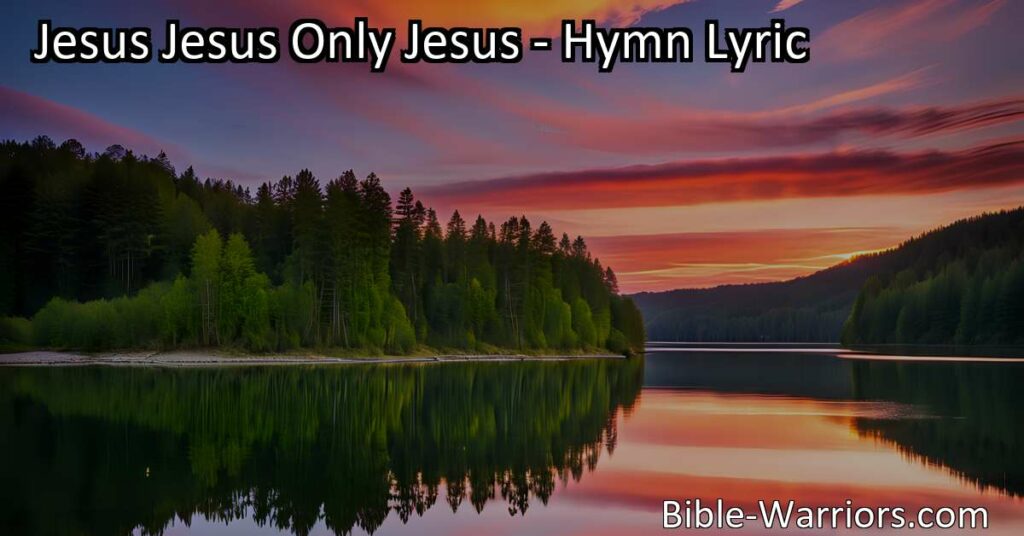Jesus Jesus Only Jesus – Hymn Lyric
In the hymn titled “Jesus, Jesus, only Jesus,” the songwriter passionately declares their devotion to Jesus and their desire to follow His will. They acknowledge Jesus as the ultimate source of satisfaction, love, and forgiveness, and express gratitude for His grace. Through heartfelt words and a longing to live according to His purposes, the writer emphasizes Jesus’ supreme importance in their life.
Table of Contents
Jesus Jesus Only Jesus – Hymn Lyric
Jesus, Jesus, only Jesus,
Can my heartfelt longing still.
Lo, I pledge myself to Jesus,
What He wills alone to will,
For my heart, which He hath filled,
Ever cries, “Lord, as Thou wilt.”
One there is for whom I’m living,
Whom I love most tenderly;
Unto Jesus I am giving
What in love He gave to me.
Jesus’ blood hides all my guilt–
Lord, O lead me as Thou wilt.
What to me may seem a treasure,
But displeasing is to Thee–
O remove such harmful pleasure;
Give instead what profits me.
Let my heart by Thee be stilled;
Make me Thine, Lord, as Thou wilt.
Let me earnestly endeavor
Thy good pleasure to fulfil;
In me, through me, with me, ever,
Lord, accomplish Thou Thy will.
In Thy holy image built,
Let me die, Lord, as Thou wilt.
Jesus, constant be my praises,
For Thou unto me didst bring
Thine own self and all Thy graces
That I joyfully may sing:
Be it unto me, my Shield,
As Thou wilt, Lord, as Thou wilt.
Meaning of Jesus Jesus Only Jesus
In this hymn titled “Jesus, Jesus, only Jesus,” the songwriter expresses their devotion and surrender to Jesus, acknowledging Him as the center of their lives. Through heartfelt words and a desire to follow His will, they proclaim Jesus’ supremacy and their willingness to live according to His plan.
The hymn begins with the repeated line, “Jesus, Jesus, only Jesus, can my heartfelt longing still.” Here, the songwriter acknowledges that only Jesus can satisfy the deep longings of their heart. In a world filled with distractions and empty promises, the writer finds solace and fulfillment in the person of Jesus Christ.
The next verse emphasizes the songwriter’s commitment to Jesus, stating, “Lo, I pledge myself to Jesus, what He wills alone to will.” This demonstrates a desire to align their desires and goals with God’s will. By surrendering their will to Jesus, they trust that He knows what is best for them and will lead them in the right path.
Furthermore, the writer expresses their love and devotion to Jesus, saying, “One there is for whom I’m living, whom I love most tenderly.” This line highlights the personal relationship the songwriter has with Jesus and the deep affection they have for Him. It also highlights the reciprocal nature of their devotion, acknowledging that Jesus first loved them and gave Himself for their sake.
In the following verse, the hymn addresses the transformative power of Jesus’ blood, stating, “Jesus’ blood hides all my guilt.” This line speaks to the forgiveness and redemption that can be found through Jesus’ sacrifice on the cross. The writer recognizes that their sins have been covered by His blood and, as a result, they are free from guilt and shame.
The next line of the verse continues with the theme of surrender and submission, declaring, “Lord, O lead me as Thou wilt.” Here, the songwriter acknowledges their dependence on God’s guidance and wisdom. They understand that following Jesus’ lead is the surest way to find true purpose and fulfillment in life.
The hymn then calls for a removal of anything that may be displeasing to Jesus, expressing a desire for what is truly beneficial. It states, “What to me may seem a treasure, but displeasing is to Thee. O remove such harmful pleasure; give instead what profits me.” This line demonstrates a willingness to let go of worldly pleasures and desires that may not align with God’s will. It reflects a desire for God’s best and a recognition that His ways are higher than our own.
The next verse speaks of the writer’s earnest desire to fulfill God’s pleasure and will, stating, “Let me earnestly endeavor thy good pleasure to fulfill.” This line shows a commitment to actively seek and pursue God’s purposes in their life. It acknowledges that following God’s will requires effort and intentionality.
The writer also acknowledges their need for God’s empowerment and presence, seeking to be used by Him to accomplish His will. They express, “In me, through me, with me, ever, Lord, accomplish Thou Thy will.” This line recognizes that without God’s strength and presence, they are unable to fulfill His purposes. They humbly submit themselves to be vessels through which God can work and bring about His plans.
The hymn then speaks of dying to oneself, both metaphorically and spiritually, stating, “In Thy holy image built, let me die, Lord, as Thou wilt.” This line expresses a desire to conform to God’s image and to let go of selfish desires and ambitions. It reflects a longing to fully surrender to God’s will and to allow Him to transform and shape their character.
The final verse of the hymn focuses on gratitude and praise for the gift of Jesus and His grace. It says, “Jesus, constant be my praises, for Thou unto me didst bring thine own self and all thy graces that I joyfully may sing.” The songwriter acknowledges that Jesus is worthy of constant praise, as He has given Himself and His grace freely. They express a desire to joyfully sing praises to Him, recognizing Him as their shield and protector.
In conclusion, this hymn titled “Jesus, Jesus, only Jesus” is a heartfelt expression of devotion and surrender to Jesus Christ. The writer acknowledges Jesus as the source of satisfaction, love, forgiveness, and guidance in their life. They express a desire to live according to His will, to let go of worldly desires, and to be used by Him to fulfill His purposes. Ultimately, the hymn emphasizes the writer’s gratitude and praise for the gift of Jesus and His grace.
I hope this hymn inspired image brings you hope and peace. Share it with someone who needs it today!



